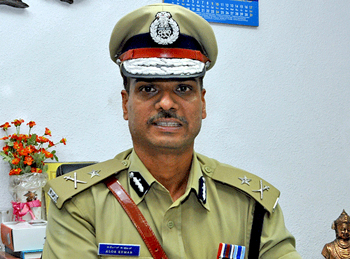Bengaluru, May 27: An?IPS officer who retired in 2010 is said to be the major beneficiary of the single-digit lottery racket that was unearthed recently.

The said IPS?officer and Alok Kumar were colleagues in the City police unit, according to sources in the Criminal Investigation Department (CID), which is investigating the case.
The investigation carried out by the CID has indicated that the retired IPS officer was one of the biggest beneficiaries in the scam and his name figured in the list of 12 serving/ retired IPS officers whom the CID intended to summon for interrogation, the sources said.
Alok Kumar, too, is said have disclosed the name of the officer, when he was grilled by the CID?on Sunday. “Alok Kumar revealed that Rajan was introduced to him by the retired officer and over a period of time, Rajan became his friend and well-wisher,” said the sources.
It is said that the officer took Alok Kumar to Hotel ITC?Gardenia several times to meet Rajan and discuss certain issues. The officer continued his relationship with Rajan even after his retirement in 2010. Rajan used the officer to establish links with other police officers. The retired officer used to advise Rajan on many issues relating to the illegal lottery trade, said the sources.
Hawala transaction
There are also reports that Rajan was into hawala transactions and this was a major reason why many officers had links with him. Sources said Rajan, a native of KGF, used to visit Bengaluru frequently and every time he did so, he met all the officials he was associated with.
It is learnt that Rajan was using his clout with senior police officers for uninterrupted transportation of hawala money. “Money laundering is rampant, through the districts bordering Bengaluru.
Safe hawala transaction
The suspicion is that Rajan used his contacts with the police top brass to ensure a safe hawala transaction,” an official said.
Sources added that hawala operators considered Bengaluru as a safe transit point and it had a well-oiled network. For a commission of anywhere around one to three per cent, huge amounts of untraceable money were transacted.
An official from the Home department said that with the CBI probe being ordered, the agency can take the help of the Enforcement Directorate to track the money trail.
“If Rajan or anyone had been making huge money either by means of illegal lottery business or through hawala transactions, it will be probed by the CBI. The Home minister referred to the possibility of engaging the Enforcement Directorate officials in the Criminal Investigation Department probe on Monday to probe the money trail. The CBI probe will cover all aspects of the businesses run by Rajan or any other accused along with him,” the official said.
Lottery Cell was set up in 2007
The Excise and Lottery Enforcement Cell was set up immediately after the ban on the lottery business in 2007.
For the first two years, the cell had no station or power to arrest. One of the senior officers, who was in the Enforcement Cell between 2007 and 2010, said that until 2011 there wasn’t much illegal lottery business reported from across the State.
“Matka and single-number lottery were very much in existence, but they used to be handled by the respective district police. As far as lottery was concerned, there was no case registered at least till 2009-10,” an official said.








Comments
Add new comment